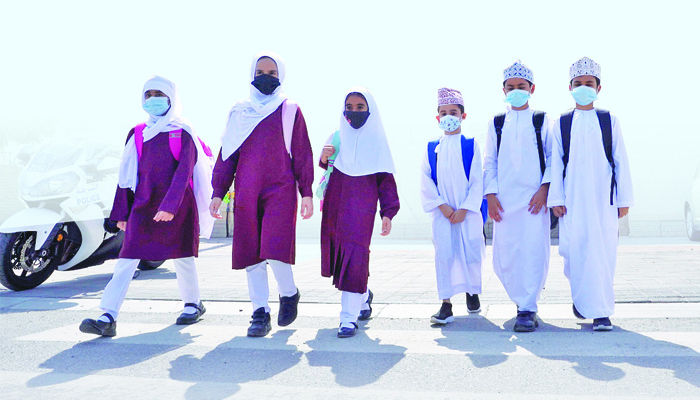
Muscat: A new hotline has been set up between schools, healthcare providers and education supervisors in the governorates across Oman as part of measures to prevent the spread of COVID-19 in the country.
The hotline will be used to report on new infection cases, as well as provide measures schools are taking to protect their students and staff, now that many campuses have reopened for physical classes.
The step is one of many taken by the Ministry of Education to safeguard people in schools from spreading or being infected by the virus, with another important measure being the setting up of isolation rooms in school clinics, for students and staff who might have symptoms associated with COVID-19. The setting up of the hotline and isolation room are among the guidelines released by the ministry that schools are required to follow.
Developments in schools are monitored by supervisory committees in each governorate, set up by the local Directorate General of Education.
According to the ministry guidelines, these committees are required to “hold a meeting with school administrations to discuss the preparation mechanism for the school year, according to alternatives approved to operate schools, and develop a plan for field visits to follow up on the implementation of recommendations, precautionary and preventive measures to limit the spread of the coronavirus.”
They are also required to coordinate with the Directorates General of Health services in governorates and spread awareness over precautionary and preventive measures against infection. This is to be done in the form of displaying posters illustrating the importance of adhering to COVID protocols, as well as printing information that students of younger age can understand.
School staff are also required to “put emphasis on commitment to physical distancing on school buses, while using facilities, washing hands with soap and water, wearing masks before getting into the bus and at school, prevention of sharing stationary with other students, and encouraging students to bring their meals and water from home.”
Executive committees need to be set up in schools to follow up on health protocols, create clear and specific work plans to implement them, make sure school facilities can accommodate students, implement all necessary updates of the Supreme Committee, hire companies to sterilise the school and provide sanitary supplies, make sure there are enough thermometers to check students’ temperatures, and effectively deal with suspectedconfirmed cases of COVID-19.
“They should also notify parents of health guidelines regarding student safety before the start of the school year though appropriate means, use available media to spread awareness of the school community and surrounding community on how to deal with the pandemic, and use the parent council in spreading awareness in the light of the pandemic,” added the guidelines.
Additionally, the entry and exit of students from the building must be done through measures following the health protocol, and single-use cups must be available to those who use water coolers. Students who feel ill must immediately inform a teacher.
In case a student is confirmed to have been infected with COVID-19, they must isolate at home, along with the rest of their family members for two weeks, until they are found to be infection-free. This process must be coordinated with school management and student affairs committees. Should students not follow these rules, they will be penalised in accordance with school regulations.
In case a student or employee does develop COVID symptoms, the Directorate General of Education will take a decision on treatment in coordination with healthcare authorities in that governorate. Parents of students are also requested to make sure their children follow the required measures, and inform them of their importance.
Procedures to confirm the presence of COVID-19 are performed by a school nurse. In case a nurse is unavailable, a member of staff must give the student in question a mask and call their parents to take them to the nearest health centre.
Rules have been drawn up for administrative and teaching staff as well. These state that all bus drivers who come to school to pick up students must have been vaccinated against COVID-19, as well as all cleaning staff working on the premises.
“All workers in the school must take precautionary and preventive measures from COVID-19,” said the guidelines. “In case a teacher feels any of the symptoms associated with COVID-19, they should not enter the school and must inform management of their case, ensure their safety till symptoms disappear, ensure they wear masks before entering the school, and bring a personal hand sanitiser.
Teachers and staff must also “make sure students follow precautionary measures, monitor students and identify suspicious cases in terms of appearance of symptoms, inform the associated committees, spread awareness to students about the importance of maintaining precautionary measures at the start of class, ensure precautionary measures are taken during meetings, and prohibit unnecessary groupings of teachers.”